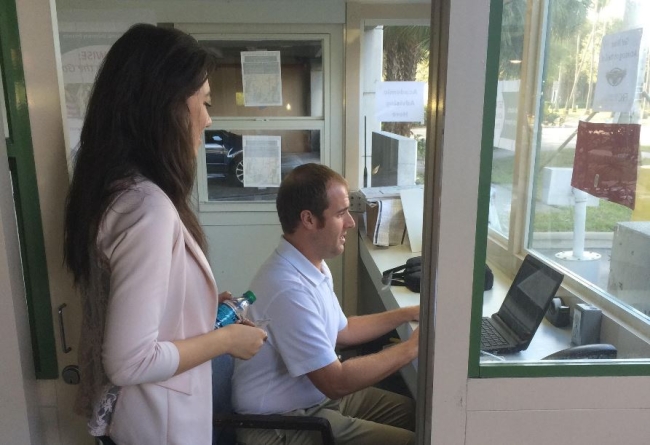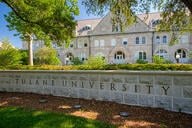You have /5 articles left.
Sign up for a free account or log in.

Joe Murray, director of university advising services at Florida Atlantic University, assists a student from inside a new parking garage advising office.
Florida Atlantic University
For students at Florida Atlantic University, getting academic advising last semester was as convenient as free parking.
Since January, two parking garages on the university’s Boca Raton campus have doubled as academic advising offices for commuter students, whose schedules had not previously allowed them to use campus advising services regularly.
“These students aren’t in the student union or in residence halls,” Joe Murray, director of university advising services at FAU, said. “And for many of them, most campus offices are closed when they’re on campus. There were students who hadn’t interacted with an office for years.”
The idea of using “drive-up advising” to reach these students started as a joke, Murray said, but it quickly turned into a reality.
The advising staff had been trying to raise awareness about its services for some time, hoping that students would start seeing academic advising as more than just course scheduling. As part of that initiative, the university placed advisers on every floor in first-year residence halls as students moved in and had floor meetings. The project, designed to help start developing lasting relationships between students and the advising services office, was deemed a success. But the staff soon realized that they were only reaching a sliver of the student body.
More than 80 percent of FAU’s students commute to campus for class, and 12 percent are evening students who are on campus only after campus offices have closed for the day.
Residential students, especially freshman, were relatively easy to find, the team discovered. “It didn’t take us long to say, ‘Well, we’re doing this for residential students, but what about commuter students?’” Murray said. “‘How can we connect with them?’”
The answer: in their cars.
“So, I said, ‘Let’s go find them there,’” Murray said. “Initially, there was some snickering at the idea of doing ‘drive-up advising.’ But then we realized that we have these parking garages with these security huts that are just sitting there.”
The spaces -- designed originally to handle parking payments -- turned out be akin to small offices, with desks, phone lines and air-conditioning. The advising staff consulted with campus security and parking services, which determined that the huts would be safe to use as long as they didn’t use the doorways that faced incoming and outgoing traffic.
It wouldn’t quite be “drive-up advising,” Murray said, as the students would have to park their cars and walk up to the booth, but it was close enough.
In December, the staff pitched the idea to the university’s provost, who -- after laughing at the novelty of the idea -- fast-tracked the project. By the start of the spring semester in January, the staff had set up printers and computers in the security booths of two of parking garages.
They were open for business. Though, at first, students were confused as to what exactly that business was.
“If we would have had a tip jar with us, we would have made a lot of money,” Murray said. “Students were trying to pay us to use the parking garage. We had to work on our signage.”
After partnering with the university’s office for student affairs, the advising staff was able to publicize the new parking garage offices with more professional signs and a social media campaign. They began passing out snacks, drinks and small prizes to entice students to check out the offices and use their walk-in services. Word began to spread.
By April, advisers had met with more than 500 students in the parking garages. Most of the students hadn't been seeing anyone for academic advising. They offered those students a variety of services including degree audits, projecting when courses will be offered in future semesters and scheduling. They also helped students set up appointments with other departments such as financial aid, admissions and career services.
The offices were open Monday and Thursday between 5 and 7 p.m., targeting students who were both leaving campus for the day and coming to campus for evening classes. The success of the program convinced the university to extend the closing time of its main advising office from 5 to 6 p.m.
Murray said that he is counting on even more students to take advantage of the parking garage advising offices in the fall. The initial pilot run was the result of just three weeks of planning. Murray said he expects a new monthslong marketing and promotional campaign to draw in many more students.
“We’ll also be dealing with students for a full year this time, not just one semester,” he said. “That will have a big impact, as we’ll be reaching students before they develop their daily patterns. Already, the program has certainly allowed us to build some really nice relationships with our commuter students that were not there before.”




